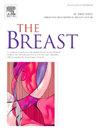Sarcopenia in patients with metastatic breast cancer: A systematic review and meta-analysis
IF 7.9
2区 医学
Q1 OBSTETRICS & GYNECOLOGY
引用次数: 0
Abstract
Background
Sarcopenia is associated with poor treatment outcomes and survival in early breast cancer and other cancer types. This systematic review and meta-analysis evaluated sarcopenia's prevalence and clinical implications for metastatic breast cancer—an area that remains underexplored.
Methods
A systematic literature review searched CINAHL, Cochrane Library, Embase, and Ovid MEDLINE for studies published before October 2024. A meta-analysis using a random- or fixed-effects model calculated mean differences in skeletal muscle index (SMI) and assessed the association with progression-free and overall survival. The study protocol was registered on PROSPERO (CRD42024557390).
Results
Fourteen studies involving 1472 participants with metastatic breast cancer were included. The pooled overall sarcopenia prevalence was 41.6 % (95 % CI 35.4 %–48.7 %), with variability driven by differing SMI cutoffs (38–41 cm2/m2). The pooled mean SMI was 41.01 cm2/m2 (95 % CI 38.81–43.21, p < .001), with significant heterogeneity (I2 = 95.3 %). Subgroup analysis revealed that patients treated with cyclin-dependent kinase 4 and 6 (CDK4/6) inhibitors as first-line treatment had an SMI of 42.08 cm2/m2. Our synthesized review showed heterogeneous association between sarcopenia and poor treatment outcomes. Sarcopenia's impact on progression-free survival (hazard ratio = 1.17, 95 % CI 0.43–1.91) and overall survival (hazard ratio = 0.99, 95 % CI 0.96–1.01) was not statistically significant.
Conclusions
Sarcopenia is prevalent and clinically meaningful in metastatic breast cancer. While its direct role in survival remains inconclusive, early assessment of sarcopenia by molecular subtype and treatment timing is crucial for optimizing care.
转移性乳腺癌患者的肌肉减少症:一项系统回顾和荟萃分析
背景:在早期乳腺癌和其他类型的癌症中,肌肉减少症与不良的治疗结果和生存率相关。本系统综述和荟萃分析评估了肌减少症在转移性乳腺癌中的患病率和临床意义——这一领域仍未得到充分探讨。方法系统检索中国图书馆(CINAHL)、Cochrane图书馆(Cochrane Library)、Embase和Ovid MEDLINE,检索2024年10月前发表的研究。使用随机或固定效应模型的荟萃分析计算了骨骼肌指数(SMI)的平均差异,并评估了与无进展生存期和总生存期的关系。研究方案已在PROSPERO上注册(CRD42024557390)。结果纳入14项研究,涉及1472名转移性乳腺癌患者。总的肌少症患病率为41.6% (95% CI 35.4% - 48.7%),差异由不同的SMI截止值(38-41 cm2/m2)驱动。合并平均SMI为41.01 cm2/m2 (95% CI 38.81 ~ 43.21, p <;.001),异质性显著(I2 = 95.3%)。亚组分析显示,接受细胞周期蛋白依赖性激酶4和6 (CDK4/6)抑制剂作为一线治疗的患者的SMI为42.08 cm2/m2。我们的综合综述显示肌肉减少症与不良治疗结果之间存在异质性关联。肌少症对无进展生存期(风险比= 1.17,95% CI 0.43-1.91)和总生存期(风险比= 0.99,95% CI 0.96-1.01)的影响无统计学意义。结论肌少症在转移性乳腺癌中普遍存在且具有临床意义。虽然其在生存中的直接作用仍不确定,但通过分子亚型和治疗时机对肌肉减少症的早期评估对于优化护理至关重要。
本文章由计算机程序翻译,如有差异,请以英文原文为准。
求助全文
约1分钟内获得全文
求助全文
来源期刊

Breast
医学-妇产科学
CiteScore
8.70
自引率
2.60%
发文量
165
审稿时长
59 days
期刊介绍:
The Breast is an international, multidisciplinary journal for researchers and clinicians, which focuses on translational and clinical research for the advancement of breast cancer prevention, diagnosis and treatment of all stages.
 求助内容:
求助内容: 应助结果提醒方式:
应助结果提醒方式:


